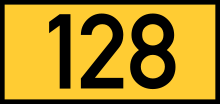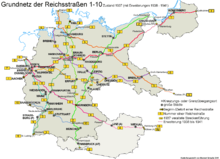Reichsstraße (Deutsches Reich)


The term Reichsstraße ("imperial road") was introduced in 1934 into Nazi Germany in place of the hitherto existing class of Fernverkehrsstraße ("trunk road") or FVS.[1] On 17 January 1932, to improve road navigation in the Third Reich, the most important long distance routes (Fernverkehrsstraßen) were numbered. From 1934, when the so-called FVS were renamed as Reichsstraßen, they were marked with yellow signs bearing their respective number in black. After the imperial motorways (Reichsautobahnen) the Reichsstraßen were the most important class of road within the jurisdiction of Nazi Germany.
The Reichsstraße routes and numbering systems were largely adopted for the Bundesstraßen ("federal roads") in the Federal Republic of Germany and the Fernverkehrsstraßen ("trunk roads") in the GDR.
System
→ See: Bundesstraße#Classification and history in Germany
Abroad
In several other countries, such as France, the equivalent roads are called national roads. In the Kingdom of Netherlands, Sweden and Norway the term Reichsweg ("imperial way") is used.
See also
- Reichsautobahn
- Berlinka (autobahn)
- Riksväg
References
- ↑ Law on the provisional new regulations for roads and road management dated 26 March 1934. RGBl 1934, Part 1, p.243ff, of 27 March 1943. Accompanying executive order dated 7 December 1934, RGBl 1934, Part 1, p.1237ff, dated 15 December 1934.